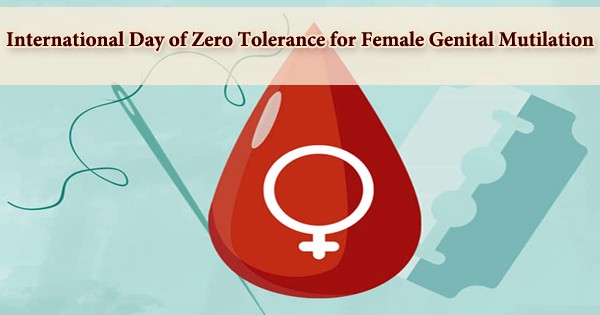Female genital mutilation (FGM) is described as any operation that involves modifying or damaging the female genitalia for non-medical purposes, and it is widely regarded as a violation of girls and women’s human rights. It is a severe form of violence against women and children, and it represents deep-seated gender inequality. On February 6, the United Nations sponsors the International Day of Zero Tolerance for Female Genital Mutilation, which is part of the UN’s attempts to eliminate female genital mutilation. It was first introduced in the year 2003. Every year on February 6th, a variety of programs and events are organized to support the United Nations’ effort to raise awareness and inform people about the risks of female genital mutilation (FGM). FGM survivors are often invited to speak at public conferences and forums about their personal experiences. Photo essays and round-table discussions on developing policies and laws to end FGM are among the other events. Coordinated and systemic initiatives are needed to facilitate the abolition of FGM, which must include whole populations and concentrate on human rights and gender equality. These campaigns should prioritize social dialogue and community empowerment in order to end the activity collectively. They must also attend to the sexual and reproductive health needs of the women and girls who are affected. The International Day of Zero Tolerance for Female Genital Mutilation is not a public holiday, but rather a worldwide commemoration. One of the supporting beliefs for this day agrees that society is in “constant flux,” and that, given the high-risk nature of FGM, its abolition must occur quickly. This is a campaign for women’s access to their bodies and the preservation of their physical wellbeing, which can have a significant impact later in life. These efforts would benefit efforts to combat violence against women and girls in general.
According to Every Woman, Every Child (a global movement), “FGM is a global issue that is practiced in some Asian and Latin American countries, despite being concentrated in 30 countries in Africa and the Middle East. Immigrant populations in Western Europe, North America, Australia, and New Zealand continue to practice FGM.” In the United States alone, recent studies show that the number of women and young girls who have been subjected to FGM has more than tripled since 1990. According to World Health Organization statistics, about 120 to 140 million women have been subjected to FGM over the years, and at least 3 million girls are at risk each year. It is an attempt to raise global awareness about FGM and encourage its abolition. “Though the practice has persisted for over a thousand years, programmatic evidence indicates that FGM/C can be eliminated in one generation,” according to the World Health Organization (WHO). FGM refers to any non-medical operation that involves the partial or complete removal of the external female genitalia or other damage to the female genital organs. This is a violation of human rights that leads to severe health problems, including fatal bleeding. On February 6, 2003, the United Nations declared the International Day of Zero Tolerance for Female Genital Mutilation. In addition to the observance, it continues to struggle against FGM through a variety of practices. In 2020, the COVID-19 pandemic would have had a disproportionately detrimental impact on girls and women, resulting in a shadow pandemic that will disrupt SDG 5.3, which calls for the abolition of all harmful practices, including female genital mutilation. To end female genital mutilation, concerted and systemic efforts are needed, involving entire societies and focusing on human rights, gender equality, sexual education, and the needs of women and girls who suffer from its consequences. The global commitment to Universal Health Coverage (UHC) provides an opportunity to reshape healthcare systems from the ground up. The inclusion of FGM in the WHO UHC Compendium highlights the importance of continuing to fund initiatives that prevent and treat the health consequences of FGM around the pandemic. At least 200 million girls and women are estimated to have undergone some kind of FGM around the world today. If current trends continue, 15 million more girls aged 15 to 19 will be exposed to it by 2030. FGM is most often performed on young girls between the ages of five and fifteen. The UN’s International Day of Zero Tolerance for Female Genital Mutilation is part of a larger initiative to achieve one of the Sustainable Development Goals, with FGM elimination being a primary priority under Goal 5. FGM has a huge human and financial cost for girls and women all over the world, as the WHO FGM Cost Calculator reveals. With the relentless pursuit of advocacy, awareness of FGM has been growing. The elimination of this destructive activity is critical to global efforts to rebuild.
















